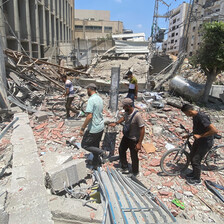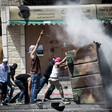The Electronic Intifada 18 July 2025

A haircut at a time of genocide.
ActiveStillsShadi was just an acquaintance before.
But our friendship grew stronger last year when my family and I fled from Tel al-Hawa to my married brother’s house in al-Zaytoun neighborhood.
I was walking in the morning when I ran into Shadi.
He was staying at one of the displacement shelters near my brother’s house.
Shadi and I chatted about the war and its impact on our lives.
Shadi then would come to my brother’s house which had solar panels.
Shadi and I would talk or play football video games on my computer while his phone charged.
Other times, we would invite him over for a simple meal.
After the ceasefire began in January, Shadi returned to Tel al-Hawa with his brother, and together they reopened their barbershop.
I have been going to Shadi’s barbershop since then – it’s 10 minutes away from my home in Tel al-Hawa, and, most importantly, Shadi is a friend.
Heavy mood, high fees
On my way to Shadi’s barbershop, I passed by neighbors and friends – no one was smiling.
The mood was heavy.
I reached Shadi’s barbershop — a small room covered with nylon sheets as its glass doors were shattered by the heavy bombardment that Israel visited upon Tel al-Hawa throughout the genocide.
I entered the barbershop, where I found Shadi – without his brother – already shaving a man.
Three other men were waiting their turn. I joined.
Shadi was using a battery-powered clipper, scissors, a razor blade and a comb.
He looked thinner than the last time I saw him on 30 March during Eid el-Fitr.
A water truck passed by on the street when some people hurried out of their homes carrying empty jerrycans, hoping to fill them with fresh water.
The truck driver told the people that the truck was empty – people’s hopes were crushed.
I felt something biting at my skin as I waited – mosquitoes. I tried to swat them away.
It seemed that the constant buzzing of Israeli drones that filled the sky or the already stifling heat weren’t enough for the swamps of mosquitoes that filled the air – drawn to the dirty water leaking from a blocked sewage line next to the barbershop.
No one in the barbershop was smiling – not even me.
The four customers and Shadi quietly spoke about the genocide only.
“There hadn’t been flour in my house for days,” Shadi said as he shaved the man.
The man was sitting on a worn-out chair, with its leather cracked and some rust creeping on the metal frame.
Shadi continued that he only gets to eat one meal a day.
He complained about how hard it is to get shaving tools – and, if found, they have become expensive.
“I recently bought a battery-powered razor to replace my electric one that I can’t charge at home anymore,” Shadi said.
He explained how he walks every morning to a place with solar panels to charge the battery-powered razor, and he has to pay one shekel (about $0.25).
Before the genocide, Shadi used to work 12 hours a day, sometimes even more.
He said, “My working hours have been cut to six or seven hours at most.”
When the battery of his electric razor runs out, Shadi has to stop working – there is no electricity in the barbershop to recharge it, so he has to go to the place with solar panels.
Even if it isn’t that busy and the battery could last through the night, Shadi still can’t continue – there is no electricity, no light.
Shadi turned to me and said, “After your last Eid visit, I bought a second-hand bicycle for 1,300 shekels [about $350] just to save on transportation.”
Transportation fees have skyrocketed ever since Israel imposed a complete siege on the Gaza Strip.
Now, Shadi said, a bicycle costs over 3,000 shekels (around $850).
As Shadi was still giving him a haircut, the first man complained about the high transfer fees – up to 40 percent.
He said he relies on money sent from abroad, but receiving it has become nearly impossible as commission rates continue to soar.
I told him he could try using a card.
He replied that it requires the internet, which is often down or too weak, and many stores add extra fees if you pay by card.
Even when he gets cash, it’s usually old, torn bills – no new money has entered Gaza since the genocide began.
Children and the sea
As the first man was still getting his haircut, a second man spoke about his daughters, who keep asking him to take them to the beach – even during the war.
Every day, he said, his daughters would ask him if it is safe to go to the beach.
The man smiled sadly, explaining how he and his daughters would pack sandwiches, take a ball and spend the day in the beach every Friday before the genocide.
It used to bring his daughters joy as they, he said, could be loud, run freely and feel like kids.
Shadi finished the first man’s haircut. The second man stood and went to sit.
He continued as Shadi trimmed his hair, saying that the sea now is a place of danger – Israeli warships are always near the shore, and sometimes they fire without warning.
He can’t risk it and put his daughters in danger. He would never forgive himself if something happened to them.
The man looked down and told us how he feels like he is failing his daughters – there’s nothing left to make them happy. No electricity, no internet, no cartoons, no school.
He tries to tell them stories, make jokes, anything. But sometimes, he said, he doesn’t even have the energy to speak.
Just one bottle
As the second man was still getting his haircut, the third man started sharing – or venting – his frustrations.
From the moment I saw him, I noticed a heaviness and sadness in his eyes.
He spoke quietly about how his son, 11, had been severely wounded in an airstrike and needed special medicine to recover.
But that kind of medicine, the man said, was no longer available in Gaza. Even basic medications had become rare and incredibly expensive.
He paused and stood up to sit in the worn-out, metal framed chair. Shadi started cutting his hair.
Sometimes, he said, the price of one bottle of medicine was more than what he made in a month.
I felt the weight of his words deeply because I had lived through a similar ordeal.
When my brother was injured, my father and I spent endless hours searching for the necessary treatment and medicine.
Now – with Israel resuming its genocidal attacks on Gaza on 18 March and stripping northern Gaza of nearly all healthcare – the already dire circumstances worsened, making access to any medical care nearly impossible.
Every day, the man said, he called hospitals, clinics and pharmacies, begging for just one bottle.
Some doctors, he said, tried to help by reaching out to international organizations like the Red Cross, but the Israeli blockade and ongoing airstrikes made it almost impossible for aid to get in.
Most of the time he stayed inside their small, dimly lit tent, watching his son suffer.
Sometimes he sits next to his son, holds his hand and wonders how long his son can keep fighting.
Watching your son lose his childhood over something as simple as medicine – this, the man said, goes beyond war or fear.
Shadi finished cutting his hair.
He paid Shadi, wiped his face with the back of his hand and said nothing more as he left the barbershop.
Pumping water
Then the fourth man sat down. He looked around 20 – my age – and had no beard.
He said almost nothing except telling Shadi how he wanted his haircut – a simple trim.
His face was blank as if the genocide had drained all expression from him.
Shadi finished cutting his hair. The young man paid, stood up and left in silence.
After about one hour of waiting, it was finally my turn.
Shadi asked me as he cut my hair, “And you? What are you struggling with?”
It is no surprise that everyone in Gaza is struggling.
I told Shadi that “I help people access clean water.”
There is a well located about 20 meters away at a neighbor Abu Khalil’s home. Around 30 families rely on it.
I’m responsible for managing the generator – which my family owns – that powers the water pump next to the well.
I had just started explaining to Shadi, “People bring diesel, which I use to—”
“Assalamualaikum,” a boy – around 14 – greeted us as he stepped into the barbershop and waited his turn for a haircut.
Shadi and I greeted him back, and I continued, “People bring diesel, which I use to run the generator and power the water pump.”
We run the pump two to five times a week, depending on water needs and the weather.
With summer approaching, people’s demands have increased.
Sometimes either the pump or the generator breaks down, and getting a specialist to come and repair either one can take two or three days due to the limited availability of parts and, of course, their skyrocketing cost.
I follow up with the repair specialist, stay beside him – whenever he chooses to appear – and eventually troubleshoot the issue.
But I’m also a second-year English literature student.
These repairs often affect my studies. But I explained to Shadi how I can’t ignore or even delay people’s need for water – it has become a lifeline and someone has to make sure it keeps flowing.
Shadi finished. I looked at the new haircut in the mirror and paid Shadi 10 shekels (about $2.50).
I went out not just with a haircut, but with the weight of four men’s stories sitting on my shoulders.
As I walked back home, the buzzing of the drones never stopped.
Mosab Habboub is a student of English in Gaza.


